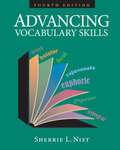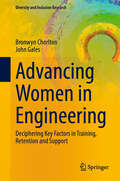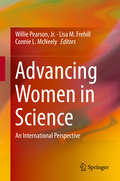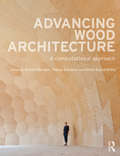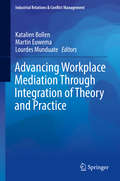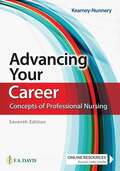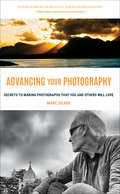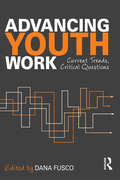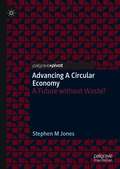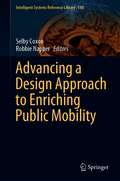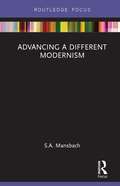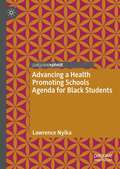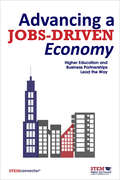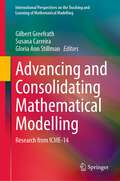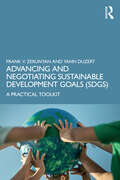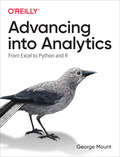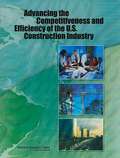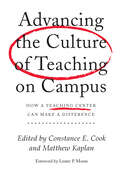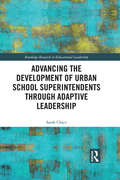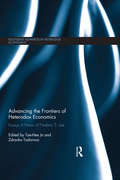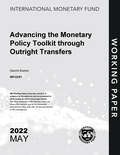- Table View
- List View
Advancing Vocabulary Skills
by Sherrie L. Nist Carole MohrThe problem is all too familiar: students just don't know enough words. Reading, writing, and content teachers agree that many students' vocabularies are inadequate for the demands of courses. Weak vocabularies limit students' understanding of what they read and the clarity and depth of what they write.
Advancing Vocabulary Skills (4th Edition)
by Sherrie L. NistThis book provides a solid, workable answer to the vocabulary problem.
Advancing Women in Engineering: Deciphering Key Factors in Training, Retention and Support (Diversity and Inclusion Research)
by John Gales Bronwyn ChorltonThe percentage of women applying for engineering licensure remains well below the percentage of women enrolling in engineering undergraduate programs--an issue of retention that continues throughout women engineers' career trajectories. Although there have been many efforts on the recruitment side to attract people of varying genders to study engineering and join the profession, such efforts are ineffective if this diverse population is not retained in engineering. This book identifies the factors affecting the recruitment of women into, and the retention of women in the engineering profession. The authors examine the experience of male and female students at the high school, undergraduate, and graduate levels to better understand women's experiences at each stage in their careers through to becoming industry members or academics. Issues such as intimidation and discouragement at the undergraduate level, disproportionate funding and support at a graduate student level, and the correlation between retention and opportunities for collaboration at an industry/academic level are discussed. The book concludes by highlighting the key findings affecting the retention of women in engineering and offers potential solutions. The findings covered in this book may be used by engineering postsecondary institutions and workplaces to create a more diverse and inclusive environment. This book is also useful to researchers, scholars, students, and academics interested in the retention of women in STEM industries.
Advancing Women in Science: An International Perspective
by Jr. Willie Pearson Lisa M. Frehill Connie L. McneelyMany countries have implemented policies to increase the number and quality of scientific researchers as a means to foster innovation and spur economic development and progress. To that end, grounded in a view of women as a rich, yet underutilized knowledge and labor resource, a great deal of recent attention has focused on encouraging women to pursue education and careers in science -- even in countries with longstanding dominant patriarchal regimes. Yet, overall, science remains an area in which girls and women are persistently disadvantaged. This book addresses that situation. It bridges the gap between individual- and societal-level perspectives on women in science in a search for systematic solutions to the challenge of building an inclusive and productive scientific workforce capable of creating the innovation needed for economic growth and societal wellbeing. This book examines both the role of gender as an organizing principle of social life and the relative position of women scientists within national and international labor markets. Weaving together and engaging research on globalization, the social organization of science, and gendered societal relations as key social forces, this book addresses critical issues affecting women's contributions and participation in science. Also, while considering women's representation in science as a whole, examinations of women in the chemical sciences, computing, mathematics and statistics are offered as examples to provide insights into how differing disciplinary cultures, functional tasks and socio-historical conditions can affect the advancement of women in science relative to important variations in educational and occupational realities. Edited by three social scientists recognized for their expertise in science and technology policy, education, workforce participation, and stratification, this book includes contributions from an intellectually diverse group of international scholars and analysts and features compelling cases and initiatives from around the world, with implications for research, industry practice, education and policy development.
Advancing Women's Health Through Medical Education: A Systems Approach in Family Planning and Abortion
by Uta Landy Philip D. Darney Jody SteinauerNeither legalization of abortion nor scientific and political advances in contraception and abortion ensure that training and research in family planning are routinely integrated into medical education. Without integration, subsequent generations of healthcare professionals are not prepared to incorporate evidence-based family planning into their practices, teaching, or research. Omission of this crucial component prevents the cultural and professional normalization of an often stigmatized and embattled aspect of women's health. Taking the successful US-based Ryan and Family Planning Fellowship programs as templates for training, teaching, and academic leadership, this book describes the integration of family planning and pregnancy termination into curricula with an international outlook. With an evidence- and systems-based approach, the book is a unique and practical guide to inspire and train the next generation of healthcare professionals.
Advancing Wood Architecture: A Computational Approach
by Achim Menges Tobias Schwinn Oliver David KriegIn light of environmental challenges architecture is facing, wood is no longer regarded as outmoded, nostalgic, and rooted in the past, but increasingly recognized as one of the most promising building materials for the future. Recent years have seen unprecedented innovation of new technologies for advancing wood architecture. Advancing Wood Architecture offers a comprehensive overview of the new architectural possibilities that are enabled by cutting-edge computational technologies in wood construction. It provides both an overarching architectural understanding and in-depth technological information through built projects and the works of four leading design research groups in Europe. The projects presented include large scale, permanent buildings such as the ETH Arch-Tec Lab Building in Zurich, the Landesgartenschau Exhibition Hall near Stuttgart and the Boiler House in Hooke Park, UK, as well as, built research prototypes investigating additive robotic fabrication, folded plate structures and meteorosensitive building skins. Illustrated in full colour, the book showcases the latest technological developments in design computation, simulation and digital fabrication together with an architectural, engineering and manufacturing perspective, offering an outlook towards novel spatial and constructional opportunities of a material with unrivalled ecological virtues.
Advancing Workforce Health at the Department of Homeland Security: Protecting Those Who Protect Us
by Committee on Department of Homeland Security Occupational Health Operational Medicine InfrastructureThe more than 200,000 men and women that make up the Department of Homeland Security (DHS) workforce have been entrusted with the ultimate responsibility - ensuring that the homeland is safe, secure, and resilient against terrorism and other hazards. Every day, these dedicated individuals take on the critical and often dangerous challenges of the DHS mission: countering terrorism and enhancing national security, securing and managing the nation's borders, enforcing and administering U. S. immigration laws, protecting cyber networks and critical infrastructure, and ensuring resilience in the face of disasters. In return, DHS is responsible for protecting the health, safety, and resilience of those on whom it relies to achieve this mission, as well as ensuring effective management of the medical needs of persons who, in the course of mission execution, come into DHS care or custody. Since its creation in 2002, DHS has been aggressively addressing the management challenges of integrating seven core operating component agencies and 18 supporting offices and directorates. One of those challenges is creating and sustaining a coordinated health protection infrastructure. "Advancing Workforce Health at the Department of Homeland Security" examines how to strengthen mission readiness while better meeting the health needs of the DHS workforce. This report reviews and assesses the agency's current occupational health and operational medicine infrastructure and, based on models and best practices from within and outside DHS, provides recommendations for achieving an integrated, DHS-wide health protection infrastructure with the necessary centralized oversight authority. Protecting the homeland is physically and mentally demanding and entails many inherent risks, necessitating a DHS workforce that is mission ready. Among other things, mission readiness depends on (1) a workforce that is medically ready (free of health-related conditions that impede the ability to participate fully in operations and achieve mission goals), and (2) the capability, through an operational medicine program, to provide medical support for the workforce and others who come under the protection or control of DHS during routine, planned, and contingency operations. The recommendations of this report will assist DHS in meeting these two requirements through implementation an overarching workforce health protection strategy encompassing occupational health and operational medicine functions that serve to promote, protect, and restore the physical and mental well-being of the workforce.
Advancing Workplace Mediation Through Integration of Theory and Practice (Industrial Relations & Conflict Management)
by Martin Euwema Lourdes Munduate Katalien BollenThis book compares the unique features of workplace mediation to other contexts of mediation, as well as the specific competences each situation requires of the mediator. It covers many important issues related to workplace mediation and discusses interventions by managers, such as conflict coaching and informal mediation. It proposes a new model to assess the effectiveness of mediation, and discusses the impact of legal systems, HRM policies, as well as power structures, and cultural differences. The book takes into account perspectives from multiple disciplines, such as management, business, psychology, law and sociology. It also discusses mediation aspects from a variety of cultural and regional contexts. The book advances knowledge about the application, process and effects of workplace mediation and includes practical tips for scholars, practitioners, mediators and managers to enhance their mediation practice or to foster constructive conflict management in organizations.
Advancing Your Career: Concepts of Professional Nursing
by Rose Kearney NunneryAdvance your career to the next level of professional practice! <p><p> Here are all the concepts and theories practicing RNs need to continue their education and reach the next level of professional practice. You’ll find in-depth coverage of the critical components of professional nursing practice, including effective communication, professional ethics, leadership, group theory, teaching/learning, and multicultural issues. <p><p> Explore the challenges and issues that are changing the field of nursing. Then, apply them to the situations you encounter in practice today . . . and to the challenges you’ll encounter tomorrow.
Advancing Your Photography: Secrets to Making Photographs that You and Others Will Love
by Marc SilberThe author of Create presents &“an all-in-one, easily accessible handbook . . . [that] will show you how the pros do it. Study this and take your best shot&” (Chase Jarvis, award-winning photographer). In Advancing Your Photography, Marc Silber provides the definitive handbook that will take you through the entire process of becoming an accomplished photographer. From teaching you the basics to exploring the stages of the full &“cycle of photography,&” Silber makes it easy for you to master the art form and create stunning pictures. From thousands of hours of interviews with professional photography masters, you will learn valuable insights and tips on beginner, amateur, landscape, wedding, lifestyle, sports, animal, portrait, still life, and iPhone photography. Advancing Your Photography features: · Top tips for making outstanding photographs from iconic photographers and many other leading professional photography masters of today · Numerous step-by-step examples · Guidance on training your eye to see composition with emotional impact · Tips on mastering the key points of operating your camera like a pro · Secrets to processing your images to professional standards Photography and the technology associated with it are constantly evolving, but the fundamentals remain the same. Advancing Your Photography will help to bring you the joy and satisfaction of a lifetime of pursuing the art of photography.
Advancing Youth Work: Current Trends, Critical Questions
by Dana FuscoThis path-breaking book brings together an international list of contributors to collectively articulate a vision for the field of youth work, sharing what they have learned from decades of experience in the training and education of youth workers. Carefully designed evaluation and research studies have legitimized the learning potential of youth programs and non-school organizations over the last twenty years, and recent attention has shifted towards the education, training, and on-going professional development of youth workers. Contributors define youth work across domains of practice and address the disciplines of knowledge upon which sound practice is based, reviewing examples of youth practitioner development both in and outside of academia. Raising critical questions and concerns about current trends, Advancing Youth Work aims to bring clarity to the field and future of youth work. Advancing Youth Work will help youth work practitioners develop a common language, articulate their field in one voice, and create a shared understanding of similarities and differences. This book is also an invaluable resource for higher educators, researchers, and students involved with youth work.
Advancing a Circular Economy: A Future without Waste?
by Stephen M JonesThis book explores an escalating modern-day crisis; managing waste in a sustainable way. The central question posed is whether advancing a circular economy provides a way to shift waste management practices towards more sustainable approaches. It begins with an in-depth analysis of the nature of waste management and the prevailing crisis, followed by a discussion about the circular economy in terms of its requirements and the challenges of implementation. The book then moves on to propose a framework that sets out how to establish the policy changes needed to advance a circular approach to waste management. Next, the book outlines complex issues in multilevel systems for advancing a circular economy through examining the contemporary situation in Belgium and Norway. It ends by bringing together the issues revealed in these case studies and draws insights for governments advocating circular approaches. The book will be a valuable resource to scholars, students, practitioners and policy makers interested in developing more sustainable methods of waste management.
Advancing a Design Approach to Enriching Public Mobility (Intelligent Systems Reference Library #198)
by Selby Coxon Robbie NapperThis book examines research at the intersection of design and public mobility from both an academic and practice perspective. An eclectic collection of projects and topics not normally found in the mainstream literature on transportation, from implementing gender-sensitive design to examining how to reconceptualize future public interactions with mobility. The book brings together leading thinkers in design and mobility from around the world and from different modal perspectives sharing insights into how we navigate the emerging public mobility landscape. This collection is valuable for transport operators and practitioners seeking to better understand the impact design can have on public mobility and innovate in a rapidly changing operational environment.
Advancing a Different Modernism (Routledge Focus on Art History and Visual Studies)
by S.A. MansbachAdvancing a Different Modernism analyzes a long-ignored but formative aspect of modern architecture and art. By examining selective buildings by the Catalan architect Lluís Domènech i Montaner (1850-1923) and by the Slovenian designer Jože Plecnik (1872-1957), the book reveals the fundamental political and ideological conservatism that helped shape modernism’s history and purpose. This study thus revises the dominant view of modernism as a union of progressive forms and progressive politics. Instead, this innovative volume promotes a nuanced and critical consideration of how architecture was creatively employed to advance radically new forms and methods, while simultaneously consolidating an essentially conservative nationalist self-image.
Advancing a Health Promoting Schools Agenda for Black Students
by Lawrence NyikaThis book centralizes the importance of using culturally relevant models within health promoting schools (HPS) to promote the participation of Black students. In current HPS models Black students are often overlooked. The author presses beyond the mainstream, science-focused research on HPS to grapple with issues of power, prejudice, and oppression and focus on the social determinants of health. By focusing on social constructs as a constraint to Black students’ wellbeing (rather than only disease), chapters present a multidimensional whole-school intervention aimed at comprehensively bridging the empowerment gap between Black students and historically privileged students.
Advancing a Jobs-Driven Economy: Higher Education and Business Partnerships Lead the Way
by STEMconnector®Aligning corporate, education, and community partners requires that we rethink and redesign the system that supports Science, Technology, Engineering and Mathematics (STEM) education and workforce preparedness. What’s at stake? Nothing less than the sustainability of our schools, the innovative engines of our businesses, the prosperity of communities, and the global competitiveness of our economies. Advancing A Jobs Driven Economy is a call to action and provides the framework for how business, education, and communities can cultivate a sustainable pipeline of STEM talent.
Advancing and Consolidating Mathematical Modelling: Research from ICME-14 (International Perspectives on the Teaching and Learning of Mathematical Modelling)
by Gilbert Greefrath Gloria Ann Stillman Susana CarreiraThis edited volume presents applications and modelling as a world-renowned sub-field of research in mathematics education. It includes the discussion on students’ development of modelling competency through the teaching of applications and modelling. The teaching of mathematical modelling is considered from different perspectives, such as mathematical, pedagogical-didactical perspectives and critical-societal or socio-political perspectives. Assessment practices (local, regional or international) of modelling activities and difficulties with modelling activities at school and university levels, respectively, are discussed. Use of technology and other resources in modelling activities and their impact on the modelling processes are included in the considerations. Teaching practices, teacher education and professional development programs concerning the integration of applications and modelling in school and university mathematics programs are developed in this context.
Advancing and Negotiating Sustainable Development Goals (SDGs): A Practical Toolkit
by Frank V. Zerunyan Yann DuzertAdvancing and Negotiating Sustainable Development Goals (SDGs) presents a negotiation framework based on the principles of network/collaborative governance in implementing UN Sustainable Development Goals (SDGs). Trialed in the classroom and workplace, the practical toolkit gives you the tools necessary for facilitating future collaboration and knowledge transfer to all those working to strengthen the formulation, implementation, and achievement of SDG-oriented policies. Advancing and Negotiating Sustainable Development Goals (SDGs) is essential reading for those interested in a better and more sustainable future for all.
Advancing into Analytics: From Excel To Python And R
by George MountData analytics may seem daunting, but if you're an experienced Excel user, you have a unique head start. With this hands-on guide, intermediate Excel users will gain a solid understanding of analytics and the data stack. By the time you complete this book, you'll be able to conduct exploratory data analysis and hypothesis testing using a programming language.Exploring and testing relationships are core to analytics. By using the tools and frameworks in this book, you'll be well positioned to continue learning more advanced data analysis techniques. Author George Mount, founder and CEO of Stringfest Analytics, demonstrates key statistical concepts with spreadsheets, then pivots your existing knowledge about data manipulation into R and Python programming.This practical book guides you through:Foundations of analytics in Excel: Use Excel to test relationships between variables and build compelling demonstrations of important concepts in statistics and analyticsFrom Excel to R: Cleanly transfer what you've learned about working with data from Excel to RFrom Excel to Python: Learn how to pivot your Excel data chops into Python and conduct a complete data analysis
Advancing the Competitiveness and Efficiency of the U.S. Construction Industry
by National Research Council of the National AcademiesConstruction productivity--how well, how quickly, and at what cost buildings and infrastructure can be constructed--directly affects prices for homes and consumer goods and the robustness of the national economy. Industry analysts differ on whether construction industry productivity is improving or declining. Still, advances in available and emerging technologies offer significant opportunities to improve construction efficiency substantially in the 21st century and to help meet other national challenges, such as environmental sustainability. Advancing the Competitiveness and Efficiency of the U.S. Construction Industry identifies five interrelated activities that could significantly improve the quality, timeliness, cost-effectiveness, and sustainability of construction projects. These activities include widespread deployment and use of interoperable technology applications; improved job-site efficiency through more effective interfacing of people, processes, materials, equipment, and information; greater use of prefabrication, preassembly, modularization, and off-site fabrication techniques and processes; innovative, widespread use of demonstration installations; and effective performance measurement to drive efficiency and support innovation. The book recommends that the National Institute of Standards and Technology work with industry leaders to develop a collaborative strategy to fully implement and deploy the five activities
Advancing the Culture of Teaching on Campus: How a Teaching Center Can Make a Difference
by Matthew Kaplan Constance E. CookWritten by the director and staff of the first, and one of the largest, teaching centers in American higher education – the University of Michigan’s Center for Research on Learning and Teaching (CRLT) – this book offers a unique perspective on the strategies for making a teaching center integral to an institution’s educational mission. It presents a comprehensive vision for running a wide range of related programs, and provides faculty developers elsewhere with ideas and material to prompt reflection on the management and practices of their centers – whatever their size – and on how best to create a culture of teaching on their campuses. Given that only about a fifth of all U.S. postsecondary institutions have a teaching center, this book also offers a wealth of ideas and models for those administrators who are considering the development of new centers on their campuses.Topics covered include:• The role of the director, budgetary strategies, and operational principles• Strategies for using evaluation to enhance and grow a teaching center• Relationships with center constituencies: faculty, provost, deans, and department chairs• Engagement with curricular reform and assessment• Strengthening diversity through faculty development• Engaging faculty in effective use of instructional technology• Using student feedback for instructional improvement• Using action research to improve teaching and learning• Incorporating role play and theatre in faculty development• Developing graduate students as consultants• Preparing future faculty for teaching• The challenges of faculty development at a research universityIn the concluding chapter, to provide additional context about the issues that teaching centers face today, twenty experienced center directors who operate in similar environments share their main challenges, and the strategies they have developed to overcome them through innovative programming and careful management of their resources. Their contributions fall into four broad categories: institutional-level challenges, engaging faculty and students and supporting engaged pedagogy, discipline-specific programming, and programming to address specific instructor career stages.
Advancing the Development of Urban School Superintendents through Adaptive Leadership (Routledge Research in Educational Leadership)
by Sarah ChaceBased on a case study of urban school superintendents in a leadership development program, this book offers a concrete demonstration of how adaptive leadership is applied and learned. Blending the theory of adaptive leadership with the practice of urban school superintendents, this book also utilizes the analytic lens of transformative learning as developed by Jack Mezirow.
Advancing the Framework for Assessing Causality of Health and Welfare Effects to Inform National Ambient Air Quality Standard Reviews
by Division on Engineering and Physical Sciences Division on Earth and Life Studies Board on Environmental Studies and Toxicology National Academies of Sciences, Engineering, and Medicine Board on Mathematical Sciences and Analytics Committee on Assessing Causality from a Multidisciplinary Evidence Base for National Ambient Air Quality StandardsAs part of its responsibilities under the Clean Air Act, the U.S. Environmental Protection Agency sets National Ambient Air Quality Standards (NAAQS) for the air pollutants carbon monoxide, lead, oxides of nitrogen, particulate matter, ozone, and sulfur dioxide. EPA uses a "weight of evidence approach" to evaluate evidence from scientific studies and describe the causal relationships between these "criteria pollutants" and any adverse impacts on human health and on public welfare - including impacts on wildlife, water, forests, agriculture, and climate. The evaluation, called an Integrated Science Assessment, is used to inform standards setting associated with the criteria pollutants. This report, produced at the request of EPA, describes EPAs and several other frameworks for inferring causality of health or welfare effects and the characteristics of evidence useful for forming a causal determination. The report concludes that EPAs causal framework is effective, reliable, and scientifically defensible, provided that key scientific questions are identified and a range of necessary expertise is engaged. More transparency in how EPA integrates evidence could improve confidence in their determinations, and more guidance is needed in the framework on how evidence should be examined for vulnerable groups (e.g., human sub-populations) and sensitive ecosystems or species.
Advancing the Frontiers of Heterodox Economics: Essays in Honor of Frederic S. Lee (Routledge Advances in Heterodox Economics)
by Tae-Hee Jo Zdravka TodorovaThis collection of essays honors the life and work of one of the most prominent and fervent heterodox economists, Frederic S. Lee, who has been at the heart of the heterodox economics movements for the past three decades. Authors in this book demonstrate that heterodox economic has transcended the criticism of mainstream economics and, more importantly, that constructive developments are in the making by way of cross-communications among various heterodox economics traditions. Frederic S. Lee’s contributions to heterodox economics are centered on three themes: the making of a history and identity of heterodox economics, heterodox microeconomics, and the heterodox analysis of social provisioning. Part I addresses the importance of history, theory, research methods, and institutions in the making of the identity of heterodox economics as an alternative to mainstream economics. Part II delves into heterodox microeconomic theories—in particular, investment, pricing, competition, markets, and market governance—as foundations of heterodox macroeconomic analyses. Part III expands the analysis of the capitalist social provisioning process with an emphasis on its subsystems and their relationships over historical time. Part IV encapsulates the life and work of Frederic S. Lee. Throughout his intellectual life Frederic S. Lee has shown to many that the development of heterodox economics is rendered possible by unselfish and ceaseless efforts to build both theory and institutions. Essays in this book attest that establishing an alternative critical theory to the status quo is not only possible but also serviceable to the majority of the population.
Advancing the Monetary Policy Toolkit through Outright Transfers (Imf Working Papers)
by BuetzerA report from the International Monetary Fund.

